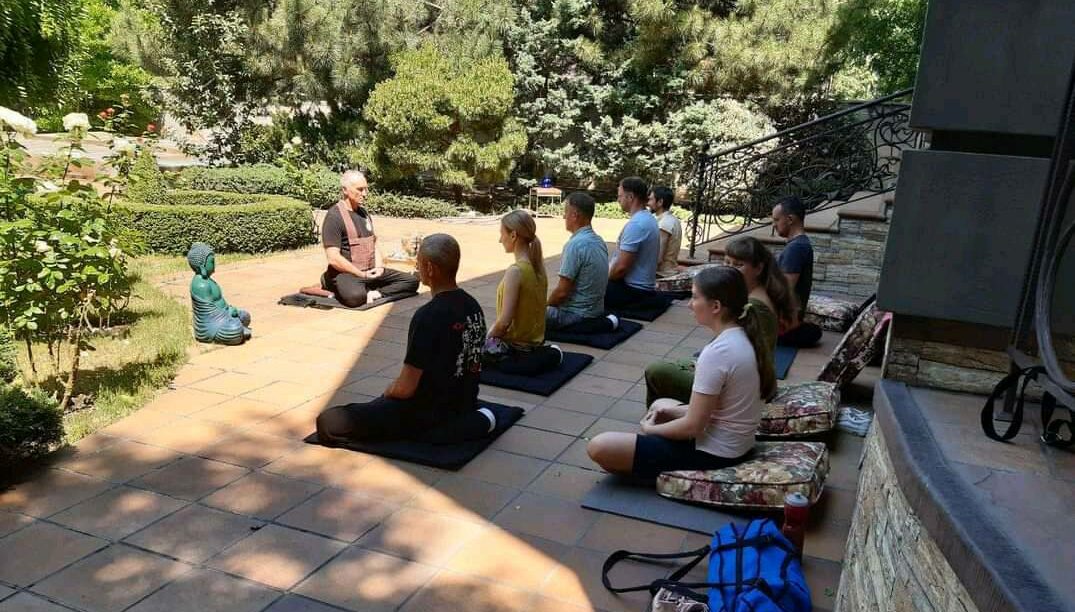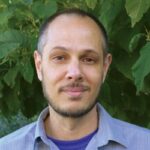Sergey Washin Tsarenko is a Zen priest — an uncommon vocation, to be sure. But Sergey’s experience is especially notable, and instructive to us, due to the fact that all that he does — live simply, simply live, practice with and teach others the dharma, volunteer in order to be of benefit to others — is being done from war-torn Ukraine. Thanks to the support of Treeleaf Zendo, an online Soto Zen Buddhist community, and the smart deployment of technology, compassion, grit, and wisdom, Sergey is making positive things happen.
In this Q&A with Lion’s Roar, he shares his experience of living in Ukraine and practicing the dharma.
Rod Meade Sperry: You are situated in Odesa. How would you characterize the past year? And how do you find things today?
Sergey Washin Tsarenko: “The war is ugly. Life will never be the same.” I have been hearing these words since the first day of the invasion. The normalcy of life has gone as things turned upside down.
For millions of Ukrainians, this has become a dark reality. The initial shock was followed by fear, grief, anger, the feeling of loss and uncertainty about the future. As for me, the feeling of being lost was the strongest one. During the first weeks of war, I could not still believe this all was happening in real life, sometimes thinking this might just be a bad dream. As days went by, I realized that life goes on and whatever form it takes, I should stay on track, continuing my practice and trying to help people where possible. I took up hosting a weekly Meditation for Peace on Zoom and joined other volunteer projects. I understood that whatever is happening, you just have to go on doing “your thing.” Everyone is important and has their place. Whether you go to defend your land on the front lines, bake bread, or supply the food, to clean streets or lead zazen sittings.
May the war in Ukraine be the last war on Earth.
Today, even though we’ve become “accustomed” to living in a state of war, the feelings are pretty much the same. Some days are quiet and we are happy about that. Others may turn into days full of anxiety and fear. You never know what will happen the next day. And here, the Zen teaching of “don’t-know mind” helps me. I simply try to focus on day-to-day doings and stick to the state of not-knowing. Life may not be the same, but it is always worth living it fully.
What’s your daily routine?
My daily routine is simple: Every morning at 6:30 I open Zoom and sit Zazen for 30 minutes together with friends from Treeleaf. In the evenings I go to work in an Asian Practices Center where I teach Taiji and Qigong. The midday is usually filled with going on errands and participating in discussion forums as well as online research related to my job. On Saturday mornings I try to regularly meet with my tree planting group to take care of our “green pets,” which grow by the seashore. In the evening I usually sit more Zazen, this time with another sangha from Poland. Every Sunday at noon, on behalf of Treeleaf, I host “Sitting for Peace,” for a worldwide community. Sometimes I join other volunteer projects like food and aid distribution, though this activity is rather occasional than regular.

How and when did you come to the dharma?
Beginning from my late teens, and more deeply in my middle twenties, I became interested in various philosophical thoughts on the purpose and meaning of life of a human being, sometimes looking up to the stars trying to find the answer. Later, in my mid-forties, I got interested in Asian religious philosophies and practices, but it wasn’t until some ten, twelve years ago that I “discovered” Zen and began practicing more deeply and regularly.
How did you come to be involved with Treeleaf Sangha? What was it that drew you to them?
Back in the time, there were no local Zen sanghas (it’s pretty much the same situation now) with whom I could share my practice experience or just come sit Zazen on a regular basis. I was practicing alone for some period whilst feeling the strong necessity to find a community or group of like-minded people. Then, sometime in the year of 2014, a friend on Facebook suggested joining Treeleaf. So, after sitting solo for a couple of years, I finally found a new home for my practice. I am deeply grateful for being welcomed there in such a heartfelt way. I feel this is the place where I belong.
Tell us about your involvement with Treeleaf’s Monastery of Open Doors.
I have been with the Monastery of Open Doors from the very beginning after Jundo Roshi offered me to join the program. I consider the MoD an innovative move, a new approach, and a great experiment where all Priests involved must learn and do things in a little bit new way. The doors of the “Training Dojo” are open to anyone wishing to receive ordination but facing difficulties to get it in “real life” due to various limitations. Whilst doing my own training, I am happy to be able to help and support others who join the monastery. I strongly believe the MoD project has a bright future and will help continue the tradition of Soto Zen Buddhist priest training. There’s room for all ways of training. In the western monasteries, monasteries of Asia, the forest and mountain hermits, and our Monastery of Open Doors.
What does it mean to ordain with a teacher through an online sangha? What is unique, or challenging, about it? What is rewarding?
Ordination in the Zen tradition is a very serious step on the path, be it online or in person. When I undertook Shukke Tokudo back in July 2019, I immediately felt all the responsibility that comes with it, a crucial turn in my life. I believe there is no big difference between being ordained in a temple, monastery, or via the online facility, provided the ordained undertake the ceremony with sincerity and an open heart and all rituals follow the traditional approach.
The uniqueness of the online sangha lies in the possibility that opens to everyone heartfully willing to practice or be ordained yet who are facing difficulties in reaching a Zen center. As far as challenges, I met some in the beginning, mostly connected with communication since English is not my first language. However, being frequently online and participating in discussions is helpful; I’m getting more comfortable with talking and writing in this second language. What is rewarding? It seems to me the reward is always the same: being able to serve people and help all beings.
How might you characterize the role of Zen practice in the lives of yourself and the people you practice with, sitting as you do with war ever-present? How has it changed since before the war was started?

I noticed that since the beginning of the war, more and more people have become interested in meditation. Our present life is full of turmoil, negative emotions, sometimes despair. So it is logical for people to seek how to calm down their hearts and balance their lives. Zen practice is relatively new to Ukrainian folk, and our sangha is pretty young, in the process of development. I tend to believe that there is a benefit for all who come to sit with us, however, everyone discovers their own Zen within, by themselves.
You’ve been involved in planting and caring for trees (as well as all sorts of volunteer work). How did you hit upon this as a focus of your work?
The “Green Coast” project, which is the group of volunteers I joined about four years ago, has been active since 2016. Up to date, we have planted and cared for over 1,600 trees. I see this activity as an important part of my practice as it is fundamentally connected to my role as a priest-in-training.
In our community we like to say that planting trees is our “response weapon” to all sorts of violence and aggression. And particularly today, when we live in a state of war, we try not to forget about beauty and that our trees are also sentient beings we must care for.
In the days after the war started, there were lots of doubts about whether we might be able to continue our work because of the threat of shelling from the sea, but we decided to not stop by all means while ensuring the maximum possible safety for people on the shore.

About twice a month you lead meditations for peace in Ukraine and the world, and have also offered full days of shared zazenkai practice undertaken with the intention of fostering peace in Ukraine. Tell us briefly about these programs — who attends, and your sense of how they benefit from attending.
As I mentioned above, every Sunday afternoon since the beginning of the invasion, I have been hosting the “Sitting for Peace in Ukraine and around the World.” These events are for the worldwide community, and participants are from different places like the US, Canada, Australia, and European countries as well as some from Asia. Usually, the number of people taking part in the session is 25-30. Traditionally we start with reciting the Heart Sutra. I do it in three languages: English, Ukrainian, and Russian. For each event, I chant the sutra in a different language. Then we sit Zazen for about 40 minutes. In the end, we recite the Verse of Atonement and Four Vows (English version).
Also, about twice a month on Sunday nights, I lead the practice of Tonglen which is taking in all the world’s suffering and sending out love and kindness. We sit meditating for about 40 minutes.
If there’s one thing our readers could do, or know, to help make a positive difference for our brothers and sisters and mahasangha-mates in Ukraine, what might that be?
First and most, I would like to express my utter gratitude to all Buddhist brothers and sisters worldwide who help and support us today. Be it by visiting to sit with us online, or by organizing their in-house meditation sessions for peace. Be it donating to our peaceful projects or helping the local sangha develop and grow. Every single act of kindness matters as we are all in this together. Thank you!
May the war in Ukraine be the last war on Earth.

